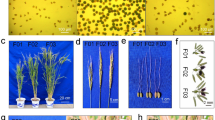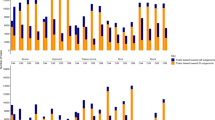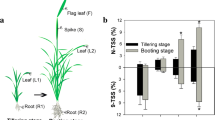Abstract
Key message
We report rampant homoeologous exchanges in progenies of a newly synthesized rice segmental allotetraploid and demonstrate their consequences to changes of gene expression and alternative splicing.
Abstract
Allopolyploidization is recurrent across the tree of angiosperms and known as a driving evolutionary force in both plants and animals. A salient feature of allopolyploidization is the induction of homoeologous exchange (HE) events between the constituent subgenomes, which may in turn cause changes in gene expression, transcript alternative splicing, and phenotypic novelty. However, this issue has been poorly studied, largely because lack of a system in which the exact parentage donating the subgenomes is known and the HE events are occurring in real time. Here, we employed whole-genome re-sequencing and RNA-seq-based transcriptome profiling in four randomly chosen progeny individuals (at the 10th-selfed generation) of segmental allotetraploids that were constructed by colchicine-mediated whole-genome doubling of F1 hybrids between the two subspecies (japonica and indica) of Asian cultivated Oryza sativa. We show that rampant HE events occurred in these tetraploid individuals, which converted most of the otherwise heterozygous genomic regions into a homogenized state of one parental subgenome. We demonstrate that genes within these homogenized genomic regions in the tetraploids showed high frequencies of altered expression and enhanced alternative splicing relative to their counterparts in the corresponding diploid parents in the embryo tissue. Intriguingly, limited overlaps between the differentially expressed genes and the differential alternative spliced genes were identified, which were partitioned to distinctly enriched gene ontology terms. Together, our results indicate that HE is a major mechanism to rapidly generate novelty in gene expression and transcriptome diversity, which may facilitate phenotypic innovation in nascent allopolyploids and relevant to allopolyploid crop breeding.




Similar content being viewed by others
Explore related subjects
Discover the latest articles and news from researchers in related subjects, suggested using machine learning.References
Allen GC, Flores-Vergara MA, Krasynanski S, Kumar S, Thompson WF (2006) A modified protocol for rapid DNA isolation from plant tissues using cetyltrimethylammonium bromide. Nat Protoc 1:2320–2325
Anders S, Huber W (2010) Differential expression analysis for sequence count data. Genome Biol 11:1–12
Anders S, Pyl PT, Huber W (2015) HTSeq-a Python framework to work with high-throughput sequencing data. Bioinformatics 31:166–169
Buggs RJA, Zhang L, Miles N, Tate JA, Gao L, Wei W, Schnable PS, Barbazuk WB, Soltis PS, Soltis DE (2011) Transcriptomic shock generates evolutionary novelty in a newly formed, natural allopolyploid plant. Curr Biol 21:551–556
Chalhoub B, Denoeud F, Liu S, Parkin IA, Tang H, Wang X, Chiquet J, Belcram H, Tong C, Samans B (2014) Plant genetics. Early allopolyploid evolution in the post-Neolithic Brassica napus oilseed genome. Science 345:950–953
Chang CY, Lin WD, Tu SL (2012) Genome-wide analysis of heat-sensitive alternative splicing in Physcomitrella patens. Plant Physiol 165:826–840
Chester M, Gallagher JP, Symonds VV, Silva AVCD, Mavrodiev EV, Leitch AR, Soltis PS, Soltis DE (2012) Extensive chromosomal variation in a recently formed natural allopolyploid species, Tragopogon miscellus (Asteraceae). Proc Natl Acad Sci USA 109:1176–1181
Combes MC, Dereeper A, Severac D, Bertrand B, Lashermes P (2013) Contribution of subgenomes to the transcriptome and their intertwined regulation in the allopolyploid Coffea arabica grown at contrasted temperatures. New Phytol 200:251–260
Doyle JJ, Doyle JL, Rauscher JT, Ahd B (2003) Diploid and polyploid reticulate evolution throughout the history of the perennial soybeans (Glycine subgenus Glycine). New Phytol 161:121–132
Doyle JJ, Flagel LE, Paterson AH, Rapp RA, Soltis DE, Soltis PS, Wendel JF (2008) Evolutionary genetics of genome merger and doubling in plants. Annu Rev Genet 42:443–461
Feng D, Peng C, Wang Z, Zhang S, Ali S, Xiong L (2014) Genome-wide analysis of alternative splicing of pre-mRNA under salt stress in Arabidopsis. BMC Genom 15:431
Filichkin SA, Cumbie JS, Dharmawardhana P, Jaiswal P, Chang JH, Palusa SG, Reddy AS, Megraw M, Mockler TC (2015) Environmental stresses modulate abundance and timing of alternatively spliced circadian transcripts in Arabidopsis. Mol Plant 8:207–227
Flagel LE, Wendel JF, Udall JA (2012) Duplicate gene evolution, homoeologous recombination, and transcriptome characterization in allopolyploid cotton. BMC Genom 13:302
Foissac S, Sammeth M (2007) ASTALAVISTA: dynamic and flexible analysis of alternative splicing events in custom gene datasets. Nucleic Acids Res 35:297–299
Gaeta RT, Pires JC (2010) Homoeologous recombination in allopolyploids: the polyploid ratchet. New Phytol 186:18–28
Grover CE, Gallagher JP, Szadkowski EP, Yoo MJ, Flagel LE, Wendel JF (2012) Homoeolog expression bias and expression level dominance in allopolyploids. New Phytol 196:966–971
Guo X, Han F (2014) Asymmetric epigenetic modification and elimination of rDNA sequences by polyploidization in wheat. Plant Cell 26:4311–4327
Haas BJ, Papanicolaou A, Yassour M, Grabherr M, Blood PD, Bowden J, Couger MB, Eccles D, Li B, Lieber M (2013) De novo transcript sequence reconstruction from RNA-seq using the Trinity platform for reference generation and analysis. Nat Protoc 8:1494–1512
He Z, Wang L, Harper AL, Havlickova L, Pradhan AK, Parkin IAP, Bancroft I (2016) Extensive homoeologous genome exchanges in allopolyploid crops revealed by mRNAseq-based visualization. Plant Biotechnol J 15:594–604
Henry IM, Tyagi A, Comai L (2014) The BOY NAMED SUE quantitative trait locus confers increased meiotic stability to an adapted natural allopolyploid of Arabidopsis. Plant Cell 26:181–194
Hurgobin B, Golicz AA, Bayer PE, Chan CK, Tirnaz S, Dolatabadian A, Schiessl SV, Samans B, Montenegro JD, Parkin I (2017) Homoeologous exchange is a major cause of gene presence/absence variation in the amphidiploid Brassica napus. Plant Biotechnol J 16:1265–1274
Jiao Y, Wickett NJ, Ayyampalayam S, Chanderbali AS, Landherr L, Ralph PE, Tomsho LP, Hu Y, Liang H, Soltis PS (2011) Ancestral polyploidy in seed plants and angiosperms. Nature 473:97–100
Keren H, Levmaor G, Ast G (2010) Alternative splicing and evolution: diversification, exon definition and function. Nat Rev Genet 11:345–355
Kornblihtt AR, Schor IE, Alló M, Dujardin G, Petrillo E, Muñoz MJ (2013) Alternative splicing: a pivotal step between eukaryotic transcription and translation. Nat Rev Mol Cell Biol 14:153–165
Kovarik A, Renny-Byfield S, Grandbastien MA, Leitch A (2012) Evolutionary implications of genome and karyotype Restructuring in Nicotiana tabacum L. In: Soltis P, Soltis D (eds) Polyploidy and genome evolution. Springer, Berlin, Heidelberg
Kraitshtein Z, Yaakov B, Khasdan V, Kashkush K (2010) Genetic and epigenetic dynamics of a retrotransposon after allopolyploidization of wheat. Genetics 186:801–812
Lashermes P, Combes MC, Hueber Y, Severac D, Dereeper A (2014) Genome rearrangements derived from homoeologous recombination following allopolyploidy speciation in coffee. Plant J 78:674–685
Li H, Durbin R (2009) Fast and accurate short read alignment with Burrows–Wheeler transform. Bioinformatics 25:1754–1760
Li H, Handsaker B, Wysoker A, Fennell T, Ruan J, Homer N, Marth G, Abecasis G, Durbin R (2009) The sequence alignment/map (SAM) format and SAMtools. Transpl Proc 19:1653–1654
Li Q, Xiao G, Zhu YX (2014) Single-nucleotide resolution mapping of the Gossypium raimondii transcriptome reveals a new mechanism for alternative splicing of introns. Mol Plant 7:829–840
Li F, Fan G, Lu C, Xiao G, Zou C, Kohel RJ, Ma Z, Shang H, Ma X, Wu J (2015) Genome sequence of cultivated Upland cotton (Gossypium hirsutum TM-1) provides insights into genome evolution. Nat Biotechnol 33:524–530
Li N, Xu CM, Zhang A, Lv RL, Meng XC, Lin XY, Gong L, Wendel JF, Liu B (2019) DNA methylation repatterning accompanying hybridization, whole genome doubling and homoeolog exchange in nascent segmental rice allotetraploids. New Phytologist. https://doi.org/10.1111/nph.15820
Lienert F, Wirbelauer C, Som I, Dean A, Mohn F, Schübeler D (2011) Identification of genetic elements that autonomously determine DNA methylation states. Nat Genet 43:1091–1097
Ling Z, Zhou W, Baldwin IT, Xu S (2015) Insect herbivory elicits genome-wide alternative splicing responses in Nicotiana attenuata. Plant J Cell Mol Biol 84:228–243
Liu L, Stein A, Wittkop B, Sarvari P, Li J, Yan X, Dreyer F, Frauen M, Friedt W, Snowdon RJ (2012) A knockout mutation in the lignin biosynthesis gene CCR33 explains a major QTL for acid detergent lignin content in Brassica napus seeds. Theor Appl Genet 124:1573–1586
Liu Z, Qin J, Tian X, Xu S, Wang Y, Li H, Wang X, Peng H, Yao Y, Hu Z (2017) Global profiling of alternative splicing landscape responsive to drought, heat and their combination in wheat (Triticum asetivum L.). Plant Biotechnol J 16:714–726
Lloyd A, Blary A, Charif D, Charpentier C, Tran J, Balzergue S, Delannoy E, Rigaill G, Jenczewski E (2017) Homoeologous exchanges cause extensive dosage‐dependent gene expression changes in an allopolyploid crop. New Phytologist 217:367–377
Madlung A, Wendel JF (2013) Genetic and epigenetic aspects of polyploid evolution in plants. Cytogenet Genome Res 140:270–285
Marquardt S, Raitskin O, Wu Z, Liu F, Sun Q, Dean C (2014) Functional consequences of splicing of the antisense transcript COOLAIR on FLC transcription. Mol Cell 54:156–165
Pertea M, Kim D, Pertea G, Leek JT, Salzberg SL (2016) Transcript-level expression analysis of RNA-seq experiments with HISAT, StringTie, and Ballgown. Nat Protoc 11:1650–1667
Quinlan AR, Hall IM (2010) BEDTools: a flexible suite of utilities for comparing genomic features. Bioinformatics 26:841–842
Reddy AS, Marquez Y, Kalyna M, Barta A (2013) Complexity of the alternative splicing landscape in plants. Plant Cell 25:3657–3683
Renny-Byfield S, Wendel JF (2014) Doubling down on genomes: polyploidy and crop plants. Am J Bot 101:1711–1725
Rosloski SM, Singh A, Jali SS, Balasubramanian S, Weigel D, Grbic V (2013) Functional analysis of splice variant expression of MADS AFFECTING FLOWERING 2 of Arabidopsis thaliana. Plant Mol Biol 81:57–69
Salmon A, Flagel L, Ying B, Udall JA, Wendel JF (2010) Homoeologous nonreciprocal recombination in polyploid cotton. New Phytol 186:123–134
Saminathan T, Nimmakayala P, Manohar S, Malkaram S, Almeida A, Cantrell R, Tomason Y, Abburi L, Rahman MA, Vajja VG (2015) Differential gene expression and alternative splicing between diploid and tetraploid watermelon. J Exp Bot 66:1369–1385
Schafer S, Miao K, Benson CC, Heinig M, Cook SA, Hubner N (2015) Alternative splicing signatures in RNA-seq data: percent spliced in (PSI). Curr Protoc Hum Genet 24:11–11
Seo PJ, Park MJ, Lim MH, Kim SG, Lee M, Baldwin IT, Park CM (2012) A self-regulatory circuit of CIRCADIAN CLOCK-ASSOCIATED1 underlies the circadian clock regulation of temperature responses in Arabidopsis. Plant Cell 24:2427–2442
Shi X, Ng DW, Zhang C, Comai L, Ye W, Chen ZJ (2012) Cis- and trans-regulatory divergence between progenitor species determines gene-expression novelty in Arabidopsis allopolyploids. Nat Commun 3:950
Smith JE, Baker KE (2015) Nonsense-mediated RNA decay: a switch and dial for regulating gene expression. BioEssays 37:612–623
Soltis PS, Marchant DB, Van de Peer Y, Soltis DE (2015) Polyploidy and genome evolution in plants. Curr Opin Genet Dev 35:119–125
Soltis DE, Visger CJ, Marchant DB, Soltis PS (2016) Polyploidy: pitfalls and paths to a paradigm. Am J Bot 103:1146–1166
Song Q, Chen ZJ (2015) Epigenetic and developmental regulation in plant polyploids. Curr Opin Plant Biol 24:101–109
Stebbins GL (1947) Types of polyploids; their classification and significance. Adv Genet 1:403–429
Sturgill D, Malone JH, Sun X, Smith HE, Rabinow L, Samson ML, Oliver B (2013) Design of RNA splicing analysis null models for post hoc filtering of Drosophila head RNA-seq data with the splicing analysis kit (Spanki). BMC Bioinform 14:1–18
Sultan M, Schulz MH, Richard H, Magen A, Klingenhoff A, Scherf M, Seifert M, Borodina T, Soldatov A, Parkhomchuk D (2008) A global view of gene activity and alternative splicing by deep sequencing of the human transcriptome. Science 321:956–960
Sun Y, Wu Y, Yang C, Sun S, Lin X, Liu L, Xu C, Wendel JF, Gong L, Liu B (2017) Segmental allotetraploidy generates extensive homoeologous expression rewiring and phenotypic diversity at the population level in rice. Mol Ecol 26:5451–5466
Syed NH, Kalyna M, Marquez Y, Barta A, Brown JW (2012) Alternative splicing in plants–coming of age. Trends Plant Sci 17:616–623
Szadkowski E, Eber F, Huteau V, Lodé M, Coriton O, Jenczewski E, Chèvre AM (2011) Polyploid formation pathways have an impact on genetic rearrangements in resynthesized Brassica napus. New Phytol 191:884–894
Trapnell C, Roberts A, Goff L, Pertea G, Kim D, Kelley DR, Pimentel H, Salzberg SL, Rinn JL, Pachter L (2014) Differential gene and transcript expression analysis of RNA-seq experiments with TopHat and Cufflinks. Nat Protoc 7:562–578
Tsunematsu H, Yoshimura A, Harushima Y, Nagamura Y, Kurata N, Yano M, Sasaki T, Iwata N (1996) RFLP framework map using recombinant inbred lines in rice. Breed Sci 46:279–284
Van de Peer Y, Mizrachi E, Marchal K (2017) The evolutionary significance of polyploidy. Nat Rev Genet 18:411–424
Vitulo N, Forcato C, Carpinelli EC, Telatin A, Campagna D, D’Angelo M, Zimbello R, Corso M, Vannozzi A, Bonghi C (2014) A deep survey of alternative splicing in grape reveals changes in the splicing machinery related to tissue, stress condition and genotype. BMC Plant Biol 14(2):99
Wang X, Hu L, Wang X, Li N, Xu C, Gong L, Liu B (2016) DNA methylation affects gene alternative splicing in plants: an example from rice. Mol Plant 9:305–307
Wang J, Symul L, Yeung J, Gobet C, Sobel J, Lück S, Westermark PO, Molina N, Naef F (2018a) Circadian clock-dependent and -independent posttranscriptional regulation underlies temporal mRNA accumulation in mouse liver. Proc Natl Acad Sci USA 115:E1916–E1925
Wang M, Wang P, Liang F, Ye Z, Li J, Shen C, Pei L, Wang F, Hu J, Tu L (2018b) A global survey of alternative splicing in allopolyploid cotton: landscape, complexity and regulation. New Phytol 217:163–178
Wittkopp PJ, Kalay G (2012) Cis-regulatory elements: molecular mechanisms and evolutionary processes underlying divergence. Nat Rev Genet 13:59–69
Wu Y, Sun Y, Sun S, Li G, Wang J, Wang B, Lin X, Huang M, Gong Z, Sanguinet KA, Zhang Z, Liu B (2018) Aneuploidization under segmental allotetraploidy in rice and its phenotypic manifestation. Theor Appl Genet 131(6):1273–1285
Xu F, Xu S, Wiermer M, Zhang Y, Li X (2012) The cyclin L homolog MOS12 and the MOS4-associated complex are required for the proper splicing of plant resistance genes. Plant J Cell Mol Biol 70:916–928
Xu C, Bai Y, Lin X, Zhao N, Hu L, Gong Z, Wendel JF, Liu B (2014) Genome-wide disruption of gene expression in allopolyploids but not hybrids of rice subspecies. Mol Biol Evol 31:1066–1076
Yang CC, Kawahara Y, Mizuno H, Wu J, Matsumoto T, Itoh T (2012) Independent domestication of Asian rice followed by gene flow from japonica to indica. Mol Biol Evol 29:1471
Yu G, Wang LG, Han Y, He QY (2012) clusterProfiler: an R Package for comparing biological themes among gene clusters. Omics J Integr Biol 16:284–287
Zhang H, Bian Y, Gou X, Zhu B, Xu C, Qi B, Li N, Rustgi S, Zhou H, Han F (2013) Persistent whole-chromosome aneuploidy is generally associated with nascent allohexaploid wheat. Proc Natl Acad Sci USA 110:3447–3452
Zhao J, Udall JA, Quijada PA, Grau CR, Meng J, Osborn TC (2006) Quantitative trait loci for resistance to Sclerotinia sclerotiorum and its association with a homeologous non-reciprocal transposition in Brassica napus L. Theor Appl Genet 112:509–516
Zhou R, Moshgabadi N, Adams KL (2011) Extensive changes to alternative splicing patterns following allopolyploidy in natural and resynthesized polyploids. Proc Natl Acad Sci USA 108:16122–16127
Acknowledgements
This work was supported by the National Natural Science Foundation of China (31500176), the National Key Research and Development Program of China (2016YFD0101004), the Recruitment Program of Global Youth Experts, the Program of Changbai Mountain Scholar and the Program for Introducing Talents to Universities (B07017).
Author information
Authors and Affiliations
Corresponding authors
Ethics declarations
Conflict of interest
The authors declare that they have no conflict of interest.
Additional information
Communicated by Alan H. Schulman.
Publisher's Note
Springer Nature remains neutral with regard to jurisdictional claims in published maps and institutional affiliations.
Electronic supplementary material
Below is the link to the electronic supplementary material.
Rights and permissions
About this article
Cite this article
Zhang, Z., Fu, T., Liu, Z. et al. Extensive changes in gene expression and alternative splicing due to homoeologous exchange in rice segmental allopolyploids. Theor Appl Genet 132, 2295–2308 (2019). https://doi.org/10.1007/s00122-019-03355-8
Received:
Accepted:
Published:
Issue Date:
DOI: https://doi.org/10.1007/s00122-019-03355-8
Profiles
- Zhijian Liu View author profile
- Xutong Wang View author profile
- Bao Liu View author profile




